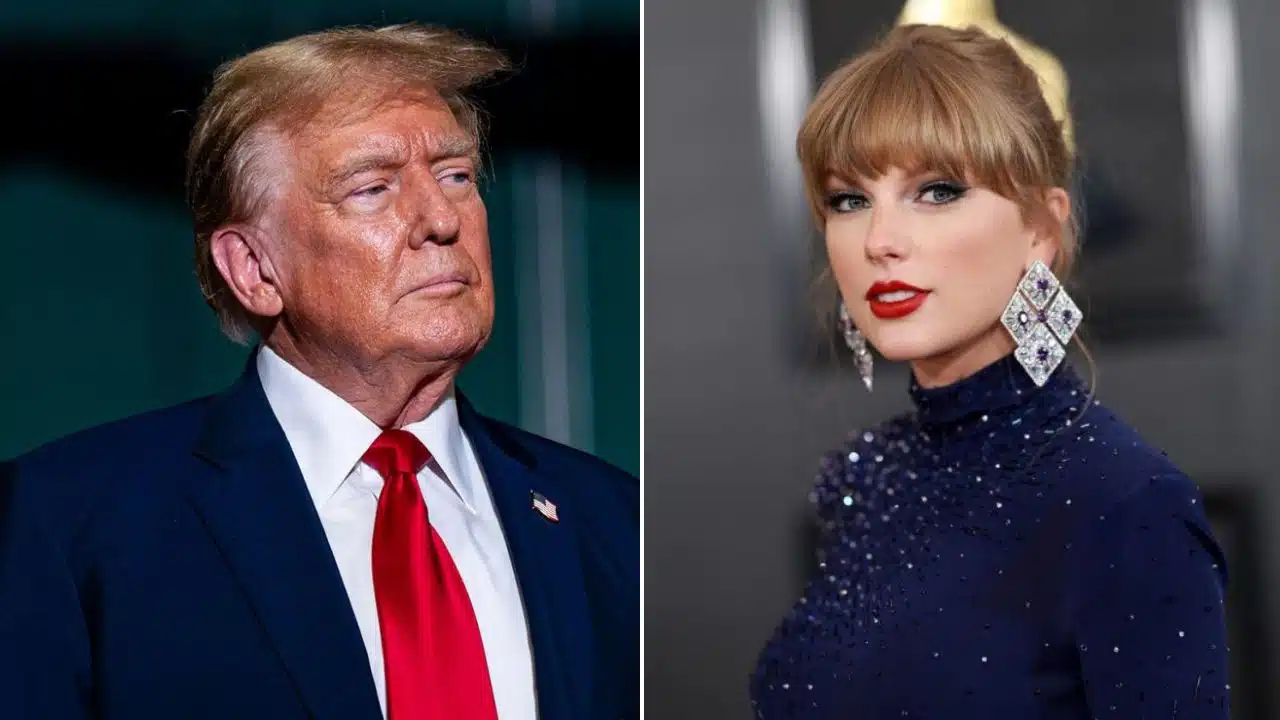Former President Donald Trump has ignited a significant controversy by sharing a series of images on his social media platform, Truth Social, which falsely depict pop icon Taylor Swift and her fans endorsing him for the 2024 presidential election. These images, which include Swift dressed in an Uncle Sam costume with the message “Taylor wants you to vote for Donald Trump,” and pictures of fans supposedly wearing “Swifties for Trump” t-shirts, have been widely criticized as AI-generated fakes.
AI-Generated Content: The New Frontier of Political Misinformation
The controversy began when Trump posted a collection of images that appeared to show Taylor Swift and her fanbase, known as the “Swifties,” throwing their support behind his 2024 presidential campaign. The images quickly caught the attention of the public and media, but not for the reasons Trump might have hoped. Upon closer inspection, many observers noted that the images displayed clear signs of being generated by artificial intelligence, a tool that has become increasingly accessible through platforms like DALL-E, Midjourney, and Stable Diffusion.
AI-generated images have become a double-edged sword in the digital age. While they offer incredible potential for creativity and innovation, they also present a dangerous tool for spreading misinformation. The images shared by Trump included one of Swift seemingly endorsing him while dressed as Uncle Sam, a classic American symbol of patriotism. Another image featured rows of enthusiastic fans donning t-shirts with the slogan “Swifties for Trump.” However, these images were not genuine, and the Swifties were quick to call out the deception.
Taylor Swift’s Political Stance: A History of Opposition to Trump
Taylor Swift, a global superstar known for her powerful lyrics and massive fanbase, has a history of being politically outspoken. In recent years, she has been particularly critical of Donald Trump and his policies. During the 2020 presidential election, Swift endorsed the Biden-Harris ticket, using her platform to encourage her millions of fans to vote against Trump. She has accused the former president of “stoking the fires of white supremacy and racism,” a statement that resonated with her fans and further solidified her position in opposition to Trump.
Given this context, the AI-generated images shared by Trump were not only misleading but also deeply offensive to many of Swift’s fans. Swift has never endorsed Trump, and the use of her likeness to suggest otherwise has sparked a wave of outrage across social media platforms. Fans were quick to point out that the images were fake, with many noting the telltale signs of AI generation, such as inconsistencies in the images and the unnatural appearance of the people depicted.
Swifties Mobilize: Calls for Legal Action and Public Condemnation
The Swifties, known for their dedication and fierce loyalty to Swift, did not take kindly to the manipulation of their idol’s image. Social media platforms like X (formerly known as Twitter) were flooded with posts from fans expressing their anger and disbelief. Many Swifties called for Swift to take legal action against Trump for using her likeness without her permission. One fan tweeted, “Swifties — let’s get Taylor’s attention on this. It’s disgusting. We know Tay does not support Trump or the use of AI to spread misinformation using her likeness. She needs to get her legal team to respond ASAP.”
The use of AI-generated content to spread misinformation is a growing concern, particularly in the political arena. The Swifties’ call for legal action highlights the broader implications of this issue. If influential figures like Swift can have their images manipulated in this way, the potential for harm is significant. Misinformation can sway public opinion, mislead voters, and undermine the democratic process. The Swifties’ reaction is a reflection of the broader anxiety about the role of AI in the spread of false information.
The Dangers of AI-Generated Misinformation in Politics
AI-generated content, including images and videos, has become increasingly common in recent years, raising serious concerns about its potential impact on society. The ease with which such content can be created and shared has made it a powerful tool for those looking to spread misinformation. In the case of Trump’s post, the AI-generated images were used to falsely associate Taylor Swift with his campaign, a tactic that could easily mislead voters who are not aware of Swift’s actual political stance.
The potential for AI-generated content to influence public opinion is particularly concerning in the context of elections. Earlier this year, the BBC reported that some Trump supporters had been creating and sharing deepfake videos of black voters to encourage them to vote Republican. These videos, like the images shared by Trump, were designed to manipulate public perception and sway voter behavior. The use of AI in this way represents a significant threat to the integrity of the democratic process.
Experts warn that the spread of AI-generated misinformation could have far-reaching consequences. As the technology continues to advance, it becomes increasingly difficult for the average person to distinguish between real and fake content. This blurring of reality poses a serious challenge to journalists, fact-checkers, and the public at large. In the case of the Swift images, the deception was quickly identified, but the incident serves as a reminder of the potential dangers of AI in the hands of those who seek to manipulate the truth.
Swift’s Influence: The Power of Endorsement in the Digital Age
Taylor Swift is not just a pop star; she is a cultural phenomenon with a fanbase that rivals the population of many countries. Her influence extends far beyond the music industry, touching on social, political, and cultural issues. With a US adult fan base nearly as large as the total number of voters in the 2020 presidential election, Swift’s endorsement could have a significant impact on the 2024 race.
The Swifties are known for their organization, dedication, and fierce loyalty to Swift. They have mobilized on numerous occasions to support causes that Swift endorses, from voting rights to LGBTQ+ issues. Their ability to organize and take action is one of the reasons why the false images shared by Trump have caused such a stir. For many Swifties, the idea of their idol being associated with Trump is not only offensive but also a distortion of reality.
In response to Trump’s post, one user commented, “She would NEVER endorse you. You’re talking about the queen of the childless cat ladies here. Girlfriend has her own damn army.” This sentiment was echoed by many others, with some speculating that the incident could push Swift to take a more active role in the 2024 election. “I hope this triggers Taylor Swift to come all out in support of Harris. You don’t play with the Swifties,” another user posted.
The potential impact of Swift’s endorsement on the 2024 election is a topic of much speculation. If Swift were to endorse a candidate, it could mobilize millions of voters, particularly young people, who make up a large portion of her fanbase. In a closely contested election, this could make a decisive difference. Trump’s attempt to associate Swift with his campaign, even through false images, underscores the power of celebrity endorsements in modern politics.
The Growing Need for Digital Literacy and Vigilance
The incident involving the AI-generated images of Taylor Swift highlights the growing need for digital literacy and vigilance in the age of AI. As technology continues to evolve, so too do the methods used by those looking to spread misinformation. The ability to create realistic-looking images and videos using AI presents a significant challenge for society, one that requires a collective effort to address.
For fans of Taylor Swift and the general public, the incident serves as a reminder of the importance of critically evaluating the content they encounter online. Just because something appears to be real does not mean it is, and the potential for deception is greater than ever before. The Swifties’ response to the incident shows that there is a growing awareness of these issues, but it also underscores the need for ongoing education and awareness.
As the 2024 presidential election approaches, the role of AI-generated content in shaping public opinion is likely to come under increasing scrutiny. The use of such content to mislead voters is a serious concern, one that could have significant implications for the future of democracy. The incident involving Taylor Swift is just one example of how AI can be used to distort reality, but it is a powerful reminder of the importance of staying informed and vigilant in the digital age.
A Cautionary Tale for the Digital Era
The controversy surrounding Donald Trump’s use of AI-generated images of Taylor Swift is a cautionary tale for the digital era. It highlights the growing threat of misinformation and the challenges posed by new technologies. For Taylor Swift and her fans, the incident is a stark reminder of the potential dangers of AI and the importance of protecting one’s image and reputation in the digital age.
As the world becomes increasingly interconnected and reliant on digital technologies, the need for critical thinking, digital literacy, and vigilance has never been greater. The Swifties’ response to the incident shows that there is power in collective action, but it also underscores the need for greater awareness and understanding of the risks posed by AI-generated content.
In the end, the incident serves as a reminder that truth and reality are precious commodities, ones that must be protected and defended in the face of new and emerging threats. For Taylor Swift, her fans, and the broader public, the message is clear: stay informed, stay vigilant, and never take anything at face value in the digital age.






































